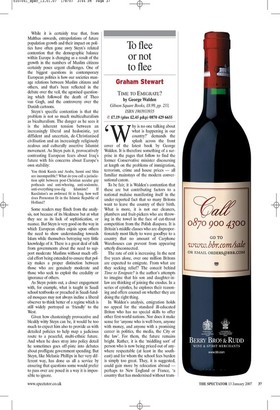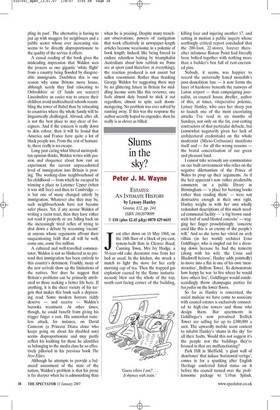To flee or not to flee
Graham Stewart TIME TO EMIGRATE? by George Walden Gibson Square Books, £8.99, pp. 233, ISBN 1903933935 © £7.19 (plus £2.45 p&p) 0870 429 6655 hy is no one talking about what is happening in our country?' demands the splash across the front cover of the latest book by George Walden. It is therefore something of a surprise in the pages that follow to find the former Conservative minister discoursing at length on the problems of immigration, terrorism, crime and house prices — all familiar mainstays of the modern conversational canon.
To be fair, it is Walden's contention that these are but contributing factors to a national malaise manifesting itself in the under-reported fact that so many Britons want to leave the country of their birth. What is more, it is not our cleaners, plumbers and fruit-pickers who are throwing in the towel in the face of cut-throat competition from the Polish diaspora. It is Britain's middle classes who are disproportionately most likely to wave goodbye to a country that no amount of Carphone Warehouses can prevent from appearing utterly disconnected.
The rate of exit is increasing. In the next five years alone, over one million Britons are expected to emigrate. From what are they seeking relief? The conceit behind Time to Emigrate? is the author's attempts to imagine that his son and daughter-inlaw are thinking of joining the exodus. In a series of epistles, he explores their reasoning and offers counsel on whether they are doing the right thing.
In Walden's analysis, emigration holds no appeal for the standard ill-educated Briton who has no special skills to offer other first-world nations. Nor does it make sense for 'anyone who is well-born, anyone with money, and anyone with a promising career in politics, the media, the City or the law'. For them, the future remains bright. Rather, it is the 'middling sort' of person who is now being priced out of anywhere respectable (at least in the southeast) and for whom the school fees burden is simply too great. They, it is suggested, could gain more by relocation abroad — perhaps to New England or France, 'a country that has modernised without tramc w pling its past'. The alternative is having to put up with muggers for neighbours and a public sector whose ever increasing size seems to be directly disproportionate to the quality of the service it offers.
A casual reading of the book gives the misleading impression that Walden sees the process as one gigantic 'white flight' from a country being flooded by disagreeable immigrants. Doubtless this is one reason why some Britons move house, although surely they find relocating to Oxfordshire or (if funds are scarcer) Lincolnshire an easier way to ensure their children avoid multicultural schools resembling the tower of Babel than by relocating to countries where the whole family will be linguistically challenged. Abroad, after all, is not the best place to stay clear of foreigners. And if the concern is really down to skin colour, then it will be found that America and France have quite a lot of black people too. From the rest of humanity, there really is no escape.
Long past caring what liberal metropolitan opinion thinks, Walden writes with passion and eloquence about how vast an experiment the current unprecedented level of immigration into Britain is proving. The working-class neighbourhood of his childhood — from which he escaped by winning a place to Latymer Upper (when it was still free) and then to Cambridge — is but one of many changed utterly by immigration. Whatever else they may be, such neighbourhoods have not become safer places. Yet, if any accuse Walden of writing a racist tract, then they have either not read it properly or are falling back on the increasingly tired reflex of trying to shut down a debate by screaming 'racism' at anyone whose arguments affront their unquestioning faith that all will be well, come one, come five million A cultured and well-travelled commentator, Walden is not so blinkered as to pretend that immigration has been entirely to this country's detriment. Frankly, many of the new arrivals show up the limitations of the natives. Nor does he suggest that Britain's problems can be primarily attributed to those seeking a better life here. If anything, it is the sheer variety of his targets that makes this book such a depressing read. Some modern horrors richly deserve — and receive — Walden's bazooka treatment. At other times, though, he could benefit from giving his trigger finger a rest. His somewhat tasteless attack, for instance, on David Cameron (a Princess Diana clone who keeps going on about his disabled son) seems disproportionate and may partly reflect his loathing for those he identifies as belonging to the media class he so effectively pilloried in his previous book The New Elites.
Although he attempts to provide a balanced assessment of the state of the nation, Walden's problem is that his prose is far sharper when he is admonishing than when he is praising. Despite many trenchant observations, powers of castigation that work effectively in newspaper-length articles become wearisome in a polemic of book length. Indeed, like being forced to endure relentless baiting by triumphalist Australians about how rubbish we Poms are at sport (and therefore at everything), the reaction produced is not assent but sullen resentment. Rather than thanking George Walden for suggesting there may be no glittering future in Britain for middling income sorts like this reviewer, one feels almost duty bound to stick it out regardless, almost to spite such doommongering. No problem was ever solved by running away. If this was the response the author secretly hoped to engender, then he really is as clever as billed.























































 Previous page
Previous page